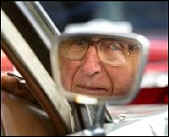|
|
Driving Old
The Free Lance Star
January 10, 2005

"Is It Safe for Dad to be driving?" That's a tough question--one everyone naturally seeks to avoid. In our automobile-centered society, discontinuing driving greatly restricts freedom. Loved ones may worry, but even approaching the sensitive subject with a parent is hard. Now, however, help is available for the commonwealth's elderly drivers.
In 2000, AAA estimated that a third of drivers were over 55 years old. Driving skills--vision, reflexes, flexibility, hearing--deteriorate beginning around age 50. Studies show that by 60, many people need 10 times more light to see clearly than a 16-year-old. Older eyes take longer to adjust to dim light and glare, and hearing at certain frequencies (say, those that include a truck's backup-warning signal or emergency sirens) decreases. Slower cognitive function and reflexes lengthen reaction time. Also, fatalities increase as one ages: A 65-year-old's fragility makes it twice as likely he or she will die in a traffic accident as a 50-year-old.
Whether or not to keep driving can be a life-or-death issue. That's why a new program by the University of Virginia is welcome. The Virginia Driving Safety Laboratory can provide a complete assessment of driving ability. The two-hour test weighs vision, driving knowledge, and neuropsychological function, and it includes driving-simulator testing. The program offers a full written report and suggestions for safety "compensations" that a senior driver can adopt. The program is pricey--$300--but thorough enough to give physicians and loved ones, as well as drivers themselves, a clear picture of a participant's motoring ability. Finally, the results of the test are private: DMV never knows.
Meanwhile, another premier state university, Virginia Tech, has teamed with Toyota to find ways to improve automobile technology to make driving safer for the elderly. For example, many aged drivers have trouble reading dashboard instruments. Most struggle with headlight and sunlight glare. Tech is studying dashboard design, windshield filters, inside and outside mirror arrangements, and a host of other accommodations.
Virginia requires of older drivers only that they renew their licenses in person at age 80, and at that time take a vision test. But everyone should understand that, inevitably, age degrades driving proficiency, that compensations can be adopted to lengthen one's driving life, and that responsible driving means monitoring one's abilities and making changes when need be.
|
|



